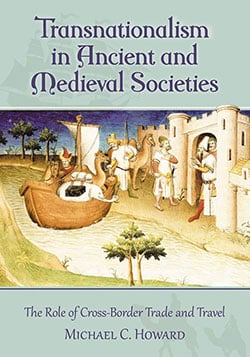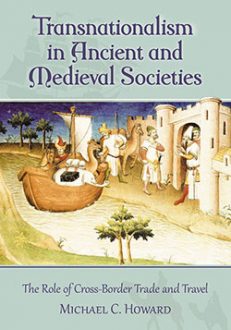Transnationalism in Ancient and Medieval Societies
The Role of Cross-Border Trade and Travel
Original price was: $39.95.$19.99Current price is: $19.99.
In stock
About the Book
While scholars have long documented the migration of people in ancient and medieval times, they have paid less attention to those who traveled across borders with some regularity. This study of early transnational relations explores the routine interaction of people across the boundaries of empires, tribal confederacies, kingdoms, and city-states, paying particular attention to the role of long-distance trade along the Silk Road and maritime trade routes. It examines the obstacles voyagers faced, including limited travel and communication capabilities, relatively poor geographical knowledge, and the dangers of a fragmented and shifting political landscape, and offers profiles of better-known transnational elites such as the Hellenic scholar Herodotus and the Venetian merchant Marco Polo, as well lesser known servants, merchants, and sailors. By revealing the important political, economic, and cultural role cross-border trade and travel played in ancient society, this work demonstrates that transnationalism is not unique to modern times. Instructors considering this book for use in a course may request an examination copy here.
About the Author(s)
Bibliographic Details
Michael C. Howard
Format: softcover (7 x 10)
Pages: 313
Bibliographic Info: notes, bibliography, index
Copyright Date: 2012
pISBN: 978-0-7864-6803-4
eISBN: 978-0-7864-9033-2
Imprint: McFarland
Table of Contents
Preface 1
Introduction 3
1. Basic Features of Transnationalism in the Ancient and Medieval World 7
Societal Types 7
Contexts 8
Motivations and Personnel 11
Transportation and Communication 12
2. Ancient Empires 27
The Middle East 28
South Asia 45
The Roman Empire 50
East Asia 58
3. Medieval Empires 70
The Byzantine Empire 70
South Asia 72
The Caliphates 73
The Tang and Song Empires 76
The Mongol Empires 81
The Aztec Empire 86
4. Polities Along the Major Trade Routes 88
The Yuezhi-Kushan 88
Tamil Kingdoms 91
Malay Kingdoms 95
5. Long-distance Trade Goods 102
Obsidian 102
Beads 104
Textiles 107
Copper and Bronze 108
Gemstones 114
Incense 117
Tropical Spices 120
Tea 125
6. Long-distance Traders 128
Phoenicians 128
Greeks 130
Sogdians 132
Trans-Saharan Caravan Traders 135
Vikings 138
Nestorian Christians 142
Radhanites and Other Jewish Traders 145
Marco Polo and the Venetians 147
Gujaratis 149
Ryukyuans 151
Aztec Traders 153
7. Merchant Communities 157
The Middle East 157
South Asia 160
Melaka 162
Guangzhou 165
Western Europe 167
8. Cities 169
Mesopotamian Cities 170
Mediterranean Cities 172
South Asian Cities 188
East Asian Cities 190
Southeast Asian Cities 193
New World Cities: Teotihuacán 204
9. Soldiers 206
Mercenaries in the Ancient Mediterranean 206
The Roman Empire’s Army 213
Medieval Mercenaries in Europe 216
Chinese Imperial Armies 222
The Aztec Military 224
10. Monks and Scholars 226
Transnational Buddhists 227
Hellenic Scholars 235
Transnational Christians 239
Transnational Muslims 247
Notes 251
Bibliography 273
Index 289





